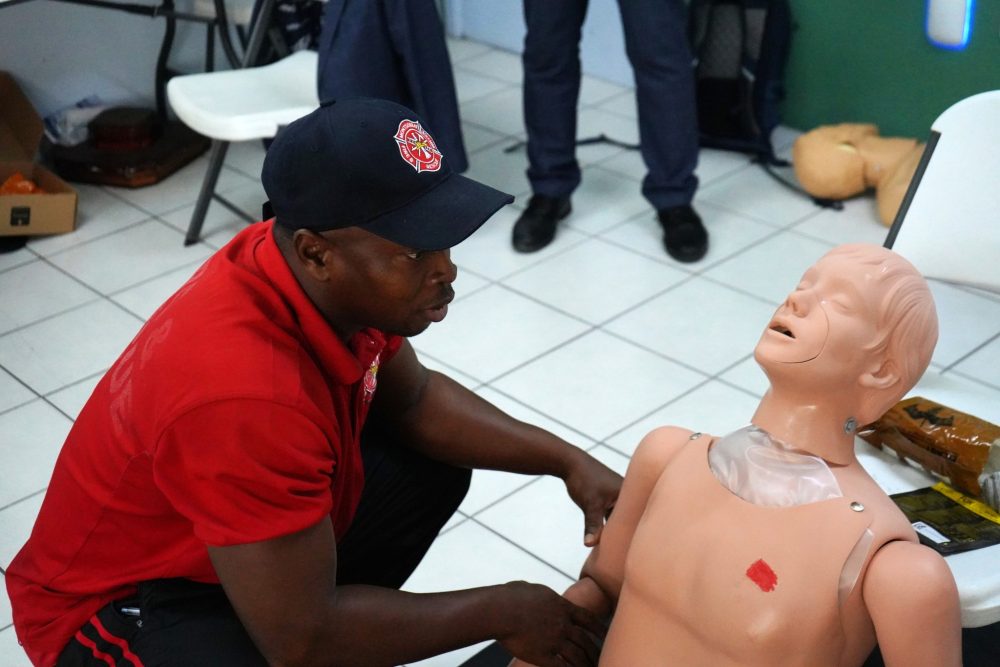Adena Johnson, Principal Trade and Quality Infrastructure Officer in the Trade and Quality Infrastructure Division said prices are on the rise and local farmers are also being affected.
Johnson was speaking at the Annual National Hurricane Conference put on by the Disaster Management Coordination Agency (DMCA) on Friday morning. She was tasked with giving an update on food stock levels now that we have entered the hurricane season.

She told the gathering of heads of departments and senior government officials that stock levels on island are not static. While some wholesalers have canned products enough for four to six months, other retailers see a regular turnover of two to three weeks.
According to the Trade division’s statistics, there are 60 to 65 commercial farmers, 100 backyard farmers, and 30 livestock farmers.
Occasionally, the Trade Division will restrict importation of cabbage, onions, and potatoes when local availability is high.
Johnson said the island is usually self-sufficient in eggs, except around December with increased consumption of baked goods. However, she recently granted licenses to allow for nine cases (30 dozen each) of eggs to be shipped in to local stores. She questioned whether the reduction in local eggs was due to the rise in the cost of feed for animals. Suppliers noted that feed for pigs has increased from $45 (2020) to $65 (2022) and feed for layer chickens is now at $63 per bag. The price for Chicken feed is expected to increase with the arrival of the next shipment.
The Trade official said freight costs have increased by about 30% over the past year.
Shop owners, she added, plan to retail the imported eggs at $20 a dozen.

The official also shared that some supermarkets have stopped importing chicken leg quarters as the price on the shelf now puts it out of reach of the average shopper. It is too expensive after shipping, duties and profit.
Other products also seeing price increases are pet food, fruits, vegetables, rice, cooking oil, chicken, pork and beef.
She said another issue affecting the market is “shrinkflation.” This means the size and packages are reduced however, the price remains the same. This is especially noticeable with cooking oil skin care and bath products, revealed Johnson.
A scarcity of sourcing containers is further exacerbating shipping woes causing additional delays. However, freight charges are expected to drop later in year.
Hurricane Readiness
As it relates to hurricane preparedness, Johnson shared that livestock farmers are ill-prepared to make it through a category four of five storm. Space for safeguarding animals is a concern, with some farmers planning to shelter them in their home.
Montserrat is at risk of food supply shortage given that it relies heavily on imports for most food items. Even a storm affecting other regional farmers and suppliers could have adverse effects on availability of food here.
The Trade officer recommended that consideration be given to subsidising risk insurance and emergency relief funds for farmers, acquiring abandoned buildings for use by livestock during storms and educating supermarket owners about the need to have their own business continuity plans in place.
The Atlantic Hurricane Season runs from June 1 until November 30 annually. For the 2022 hurricane season, the National Oceanic and Atmospheric Administration (NOAA) is forecasting a likely range of 14 to 21 named storms (winds of 39 mph or higher), of which 6 to 10 could become hurricanes (winds of 74 mph or higher), including 3 to 6 major hurricanes (category 3, 4 or 5; with winds of 111 mph or higher). NOAA provides these ranges with 70% confidence.
Discover more from Discover Montserrat
Subscribe to get the latest posts sent to your email.



